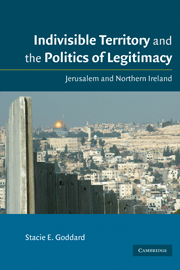Book contents
- Frontmatter
- Contents
- Acknowledgments
- 1 Introduction
- 2 Constructing Indivisibility: A Legitimation Theory of Indivisible Territory
- PART ONE CONSTRUCTING AN INDIVISIBLE IRELAND
- Introduction
- 3 Home Rule: A Divisible Ireland
- 4 “Ulster Will Fight”: The Orange Card and an Indivisible Ireland
- PART TWO JERUSALEM: THE ETERNAL INDIVISIBLE CITY
- 8 Conclusion
- Bibliography
- Index
4 - “Ulster Will Fight”: The Orange Card and an Indivisible Ireland
from PART ONE - CONSTRUCTING AN INDIVISIBLE IRELAND
Published online by Cambridge University Press: 26 January 2010
- Frontmatter
- Contents
- Acknowledgments
- 1 Introduction
- 2 Constructing Indivisibility: A Legitimation Theory of Indivisible Territory
- PART ONE CONSTRUCTING AN INDIVISIBLE IRELAND
- Introduction
- 3 Home Rule: A Divisible Ireland
- 4 “Ulster Will Fight”: The Orange Card and an Indivisible Ireland
- PART TWO JERUSALEM: THE ETERNAL INDIVISIBLE CITY
- 8 Conclusion
- Bibliography
- Index
Summary
In the nineteenth century, the Anglo-Irish conflict was very much divisible. Far from taking intractable positions, all sides believed that shared sovereignty was a legitimate settlement to territorial conflict. With Irish and British public opinion firmly behind them, Liberals and Constitutional Nationalists introduced a Home Rule Bill on April 11, 1912, fully confident that it would pass by a large majority. Despite this optimism, from 1912 to 1921 compromise proved impossible. By 1912, British Conservatives refused to allow autonomous rule for Ireland unless Northern Ireland was partitioned, excluded from the Irish autonomous parliament. This position, not surprisingly, proved entirely illegitimate to both Constitutional Nationalists and Republicans, who saw partition as an affront to the integrity of the Irish nation. At the same time, the Irish began to frame Home Rule as a republican demand. Whereas Irish nationalism had long been portrayed as commensurate with imperial rule – the Irish could be both a separate nation and imperial subject – Irish parties now rejected any allegiance to the Crown.
Neither identity nor interests are sufficient to explain this change in positions. Certainly one cannot tell this story of bargaining failure without discussing nationalism and religion; yet if identities had not led to indivisible territorial claims in the past, why did they do so now? When viewed as a question of interest the indivisibility of the conflict is also puzzling. However polarized the British and Irish positions, this polarization was not one of interests.
- Type
- Chapter
- Information
- Indivisible Territory and the Politics of LegitimacyJerusalem and Northern Ireland, pp. 81 - 114Publisher: Cambridge University PressPrint publication year: 2009

